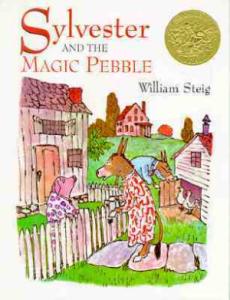Good message, potentially scary story.

I guess this is technically well done for a book about being careful what you wish for, but I think maybe it's a little disturbing for younger kids. I mean, it's not gory or anything, but I think my 4-year-old would be scared of this (but then he's already scared of rocks-- big ones that might fall and break our house despite us not living anywhere near such things). I think it's probably aimed at children a little older than him.
The story: there's a donkey named Sylvester who lives in a house (oddly, his parents wear clothes but he doesn't) and collects unusual pebbles. He finds a red, shiny, perfectly round rock, and is surprised by this, so he picks it up. The rain is bothering him, so he wishes it would stop raining, and the rain immediately stops. He thinks that's weird, and wonders if the pebble might be magic. I really like what happens next: "To make a test, he put the pebble on the ground and said, 'I wish it would rain again.' Nothing happened. But when he said the same thing holding the pebble in his hoof, the sky turned black, there was lightning and a clap of thunder, and the rain came shooting down." He tests it! He doesn't just assume it's magic; he tests it like a scientist! It's just one test, but that's more than you get in most stories of this sort. He then wishes the Sun back in the sky, and wishes a wart on his left hind fetlock would disappear, and it does. I just love the fact that he tests it. He realizes that he's really lucky, and that he and his family can have anything they want, and then he starts taking it home to them. As he's walking home, a lion attacks him.
I have no idea where Sylvester lives. His neighbors are shown to be other animals, usually dressed and walking on their hind legs, but the lion is naked like Sylvester. The lion also walks on all fours. This universe is somewhat inconsistent. At any rate, when Sylvester is attacked, he is super frightened: "He panicked and couldn't think carefully." Which makes sense. In his moment of panic, he wishes he were a rock. At which point, he turns into a rock and drops the pebble. The lion can't eat the rock, so he walks away. But since Sylvester has dropped the pebble, he can't wish himself back again and he can't pick up the pebble to do so. That is straight up body horror right there. He's turned into a living, thinking rock. He is alive, and yet a rock at the same time. This is the disturbing part. Sylvester only makes his way out through pure luck. His parents search for him everywhere, going from door to door, talking to the police (who are pigs, of course), they send all the dogs out to smell for him, but they can't find him (despite the fact that dogs can smell trails, and Sylvester would have been a donkey as he walked to where he turned into a rock). So they eventually give up. They figure that something terrible happened to him and they'll never see him again. Fall comes. Winter comes. Spring comes. The parents are trying to cheer themselves up, so they go on a picnic. They sit on the rock, which wakes up Sylvester from his deep winter sleep (he had been "sleeping" and kind of fell out of awareness for a while, so it wasn't 24/7 feeling trapped as a living rock). His parents eat, using him as a table, and his father sees the pebble and picks it up, and puts it on top of the table, him. His parents, who still (despite not having any other children) refer to each other as "Father" and "Mother" wish that Sylvester were there (but they're not touching the pebble). Then Sylvester, hearing this, wishes he were himself again. Since he is touching the pebble, he turns back into a donkey, all the food falls off of him, and everybody is amazed and there is a tearful reunion. They take home the magic pebble and put it in an iron safe because, "For now, what more could they wish for? They all had all that they wanted." Which is a great message.
I just think it's potentially upsetting that the child turns into a rock and stays that way for a long time. His parents are distraught (although I suppose it would be worse if they weren't). Clearly in this universe, magic is extremely powerful and permanent. If it was something a little less drastic, and he didn't stay that way for almost a year, this would be a good book. I really love the scientific moment, and the message of appreciating what you have. Maybe when my kids are old enough to completely understand that magic isn't real, like at age seven or eight, I might read this to them.